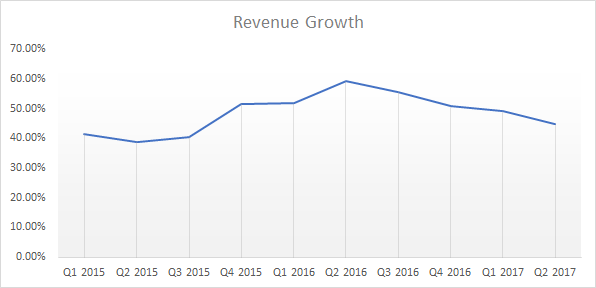How Facebook Plans To Improve Revenue And Engagement Levels Going Forward
Facebook (NASDAQ: FB) has been facing “context collapse,” as many users have been less willing to share data and personal content in the face of increasing advocacy for privacy. This could potentially erode the company’s ability to serve targeted ads due to a decline in available user data, which would negatively impact revenue growth. The company’s revenue growth has already slowed down somewhat, as shown in the chart below.

At the same time, users are sharing more news links and videos with their peers. Last year, Facebook streamlined the sharing of news links and introduced live video streaming services to its platform. More recently, the company has introduced popular features such as Stories to its platform and also extended its video offering across its platforms (Facebook, Instagram, Messenger and Whatsapp). Below we explore the strategy Facebook is following to ensure sustained growth in the future.
See our complete analysis for Facebook here.
Facebook’s Strategy To Achieve Higher Growth
As privacy has become a more prominent concern among social media users, the use of apps such as Instagram and Snapchat, which promote somewhat smaller and more closed communities, has risen. As a result, engagement levels on Facebook’s primary platform – for both users and advertisers – have declined. In fact, the growth in ads has slowed down despite an improvement in cost per ads, per Bloomberg. This trend is contrary to Google, where growth in ad volumes is offsetting the decline in ad prices.

Facebook’s popular Stories features have improved engagement levels, and should boost revenues as well as the company as it is showcasing ads through them. However, to ensure that it continues to outpace the online ad market, the company needs to innovate continuously to improve engagement levels and ad revenues across its platform. To that end, Facebook is looking to improve engagement by increasing the video content across its platform, as the propensity to watch and share videos is on the rise among users. Initially, Facebook focused on camera-centric communication through Stories. It plans to further push in the personal video communication vertical with offerings such as Facebook Spaces, which uses virtual and augmented reality.
The company is also focusing on third-party video content to improve retention and engagement among users. Earlier in the year, the company introduced short length videos on Facebook to drive engagement. In the most recent move, Facebook launched the Watch video service, a platform that lets users view videos based on their likes and what communities and/or friends are watching. We believe that this push for video will help the company to grow revenues in the near term.
Facebook is also looking to monetize third-party content such as articles. The company plans to implement paywall services for its instant articles. Through this service, content publishers will be able to persuade users to either sign up for a digital subscription or to limit the number of free articles available to them. While the beta version of the new subscription service is expected to roll out in October, the details remain somewhat limited. Nevertheless, this is a step in the right direction as Facebook users will have access to premium content on the platform.
Interactive Institutional Research (Powered by Trefis):
Global Large Cap | U.S. Mid & Small Cap | European Large & Mid Cap |More Trefis Research
